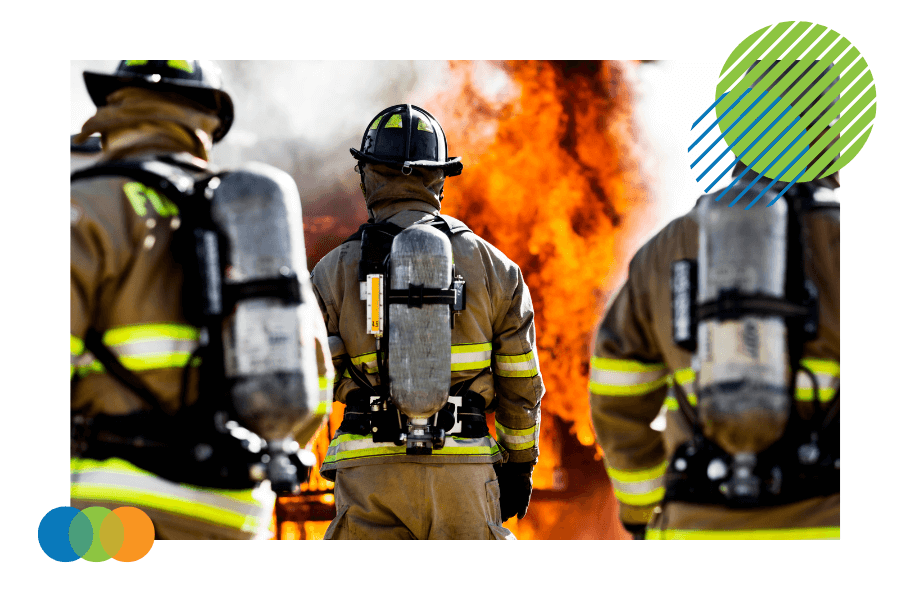 |
Written by Liz McDermott |

Safety certifications are vital in today's business landscape, offering numerous benefits for workers and businesses. Being able to protect people and the environment from harm is a rewarding career, but it could be highly stressful. A safety certification makes it easier by providing additional training and knowledge of frameworks and practices to improve safety management continuously.
Let's explore how investing in the proper certification provides career advancement, job security, and personal growth.

TABLE OF CONTENTS:
- What Is a Professional Safety Certification?
- Is a Safety Certification Right for You
- Three Benefits of Earning Safety Certifications
- Benefits of Becoming Certified as a Safety Manager
- Degree-Based Safety Certifications
- Safety Certification Requirements
- Top Safety Certifications
- Top Priority Construction Certifications: Which Should I Obtain First?
- Non-Degree Safety Certifications
- Specialized Safety Certifications
- Educational (Role Specific) Safety Designations

What Is a Professional Safety Certification?
In today's rapidly evolving world, where safety concerns are at the forefront of every industry, having a professional safety certification can significantly enhance your career prospects and improve the success of your business. Professional safety certification is a recognized credential that demonstrates your expertise and knowledge in occupational safety and risk management. These certifications are typically awarded by industry-leading organizations and provide a standardized measure of competency in ensuring workplace health and safety activities.
Is a Safety Certification Right for You?
A safety certification can be a game-changer if you are passionate about occupational safety and want to advance your career. Whether you are a safety professional or a business owner, a safety certification can give you a competitive edge in the job market and instill confidence in your clients and stakeholders. It enhances your credibility and demonstrates your commitment to maintaining the highest standards of safety in your workplace.

Three Benefits of Earning Safety Certifications
1. Expanded Career Opportunities
One of the most significant benefits of earning safety certifications is the expanded career opportunities. Certified safety professionals are in high demand across industries, including construction, manufacturing, healthcare, and transportation. Employers often prioritize candidates with certifications as they assure expertise and ability to mitigate risks. A safety certification opens doors to higher-paying positions, promotions, and increased job security.
2. Enhanced Professional Credibility
Certified safety professionals are recognized as experts in their field, which enhances their professional credibility. When you hold a safety professional certification, you demonstrate to employers, clients, and colleagues that you have undergone rigorous training and possess the necessary skills and knowledge to ensure workplace safety. This credibility can increase trust, improve working relationships, and significantly influence your organization.
3. Improved Risk Management
Safety certifications equip you with the tools and knowledge to identify and mitigate potential workplace hazards. With proper safety training, you can develop comprehensive risk management strategies that protect employees, prevent accidents, and ensure regulatory compliance. Implementing these strategies creates a safer work environment and reduces the likelihood of costly accidents, legal disputes, and reputational damage.
Benefits of Becoming Certified as a Safety Manager
If you aspire to become a safety manager, safety certification is essential to your professional growth. Certified safety managers possess the knowledge and skills to develop and implement comprehensive safety programs, perform risk assessments, and train employees on safety protocols. This certification demonstrates your expertise and positions you as a leader in your field. As a certified safety leader or manager, you can effectively navigate complex safety challenges, make informed decisions, and drive a safety culture within your organization.
Degree-Based Safety Certifications
For individuals seeking a more comprehensive understanding of safety management, degree-based safety certifications offer a valuable option. These certifications are typically earned through completing a bachelor's or master's degree program in occupational safety, occupational health, or a related field. The degree-based approach provides a solid foundation in safety principles, risk assessment, emergency response, and regulatory compliance. A degree-based safety certification can enhance career prospects and open doors to higher-level management positions.
Safety Certification Requirements
While the specific requirements for safety certifications may vary depending on the organization and certification, there are generally standard criteria that candidates must meet. These may include education, work experience, and passing a certification exam. It is essential to carefully review the requirements for each certification you are interested in pursuing to ensure you meet the necessary qualifications.

Top Safety Certifications
Several highly regarded professional safety certifications can significantly impact your career and business. Let's explore some of the top occupational safety and risk management certifications.
ASP – Associate Safety Professional
The Associate Safety Professional (ASP) certification is ideal for individuals new to the safety field and seeking to establish a solid foundation. This certification is awarded by the Board of Certified Safety Professionals (BCSP). It requires a minimum of a bachelor's degree in any field or an associate degree in safety, health, or environmental issues. The ASP certification demonstrates your commitment to safety and positions you for further professional growth.
CSP - Certified Safety Professional
The Certified Safety Professional (CSP) certification is widely recognized as the gold standard in the safety profession. The BCSP awards it and requires a bachelor's degree in any field, an associate degree in safety, health, or environmental issues, and relevant work experience. After passing the CSP test, the CSP certification signifies a high level of expertise in safety management and qualifies you for senior-level safety positions.
Top Priority Construction Certifications: Which Should I Obtain First?
If you work in the construction industry, obtaining the proper safety certifications is crucial to ensure the well-being of your team and compliance with industry regulations. Here are two certificates that should be at the top of your list:
OHST - Occupational Hygiene and Safety Technician
The Occupational Hygiene and Safety Technician (OHST) certification is designed for individuals working in and performing occupational hygiene, safety, and health in the construction industry. Awarded by the BCSP, this certification demonstrates your competence in identifying and mitigating safety hazards on construction sites. Holding an OHST certification showcases your commitment to maintaining a safe work environment in the construction industry.
Graduate Safety Practitioner (GSP)
The Graduate Safety Practitioner (GSP) certification is an entry-level certification awarded by the BCSP. It is designed for individuals who have recently graduated with a degree in occupational safety, health, or a related field. The GSP certification provides a pathway to obtaining the CSP certification and demonstrates your commitment to ongoing professional development.
Non-Degree Safety Certifications
Several options are available if you are seeking specialized certifications that do not require a degree. These certifications focus on specific areas of safety management and can provide targeted expertise to enhance your career prospects.
SMS - Safety Management Specialist
The Safety Management Specialist (SMS) certification is awarded by the American Society of Safety Professionals (ASSP). It is designed for safety professionals with at least five years of experience in effective safety program management. The SMS certification demonstrates your advanced knowledge and skills in developing, implementing, and managing comprehensive safety programs.
STS – Safety Trained Supervisor
The BCSP awards the Safety Trained Supervisor (STS) certification, ideal for individuals who supervise employees in safety-sensitive positions. It focuses on providing supervisors with the necessary knowledge and skills to identify and address safety hazards, ensure compliance with safety regulations, and effectively communicate safety protocols to their teams.
Certified Safety Manager (CSM)
The Certified Safety Manager (CSM) certification is offered by the Institute for Safety and Health Management (ISHM) and is suitable for experienced safety professionals. This certification validates your expertise in safety management, risk assessment, and regulatory compliance. Holding a CSM certification demonstrates your commitment to excellence in safety management.
Certified Safety Management Practitioner (CSMP)
The Institute of Hazardous Materials Management (IHMM) offers the Certified Safety Management Practitioner (CSMP) certification and is suitable for experienced safety professionals. This certification validates a technical level of safety expertise and high-level management skills. Ideal for EHS Managers with experience but limited formal education or for Plant or Project Managers, Engineers, or HR Professionals, whose duties include some EHS Management responsibilities.
Certified Safety Manager Construction (CSMC)
The Certified Safety Manager Construction (CSMC) certification offered by ISHM is highly regarded for those working specifically in safety-related programs in the construction industry. This certification focuses on the unique safety challenges faced in construction and equips you with the skills and knowledge needed to ensure a safe work environment on construction sites.
CHMM – Certified Hazardous Materials Manager from the Institute of Hazardous Materials Management (IHMM)
The Certified Hazardous Materials Manager (CHMM) certification is awarded by the IHMM and is designed for professionals who manage hazardous materials and waste. This certification demonstrates your competence in identifying, assessing, and handling hazardous materials to protect human health and the environment.
CHST – Construction Health and Safety Technician
The BCSP awards the Construction Health and Safety Technician (CHST) certification and is specifically tailored for individuals working in the construction industry. This certification provides a comprehensive understanding of safety management principles and equips you with the skills to identify and mitigate safety hazards on construction sites.
Certified Safety and Health Manager (CSHM)
The Certified Safety and Health Manager (CSHM) certification is offered by the Institute for Safety and Health Management (ISHM) and the Institute of Hazardous Materials Management (IHMM). It is ideal for safety professionals looking to enhance their knowledge and skills in safety management. This certification covers many safety topics, including risk assessment, preparing emergency response plans, and regulatory compliance.
Licensed Safety Professional (LSP)
The Licensed Safety Professional (LSP) certification is awarded by the Board of Environmental, Health, and Safety Auditor Certifications (BEAC). It is designed for professionals with expertise in safety management and compliance. Holding an LSP certification demonstrates your commitment to excellence in safety and environmental training and positions you as a leader in your field.
CIT – Certified Instructional Trainer
The Certified Instructional Trainer (CIT) certification is awarded by the National Safety Council (NSC) and is ideal for professionals who deliver safety training within their organizations. This certification ensures you have the skills to effectively communicate and implement proper safety training protocols and train employees on best practices.
STSC – Safety Trained Supervisor Construction
The BCSP awards the Safety Trained Supervisor Construction (STSC) certification and is specifically tailored for supervisors working in the construction industry. This certification equips supervisors with the knowledge and skills to promote a safety culture on construction sites and ensure compliance with safety regulations.
Certified Industrial Hygienist (CIH)
The Certified Industrial Hygienist (CIH) certification is awarded by the American Board of Industrial Hygiene (ABIH) and is designed for professionals specializing in identifying and mitigating workplace hazards. This certification demonstrates your expertise in industrial hygiene and positions you as a leader in protecting workers' health and safety.

Specialized Safety Certifications
In addition to the abovementioned certifications, several specialized safety certifications cater to specific industries and roles. These certifications provide targeted expertise and can significantly enhance your career prospects in niche areas of safety management.
Educational (Role Specific) Safety Designations
Educational safety designations focus on specific roles within the safety profession. These certifications provide specialized knowledge and skills to excel in particular areas of safety management. The Certified Healthcare Safety Professional (CHSP) is offered by the International Board for Certification of Safety Managers (IBFCSM). This certification is designed for professionals working in healthcare settings and demonstrates your expertise in ensuring safety in a healthcare environment.
Conclusion: Safety Certifications Help Build a Successful Career in Safety Management
Earning safety certifications is just the first step towards building a successful career in safety management. To truly excel in this field, staying up-to-date with the latest industry trends, regulations, and best practices is essential. Engaging in continuous professional development, attending industry conferences, and networking with other safety professionals can provide valuable insights and opportunities for growth. By continuously expanding your knowledge and skills, you can position yourself as a leader in occupational and safety management specialists and take your career and business to new heights.
For more information, please contact us to inquire about our Safety Certification Exam Prep training.


